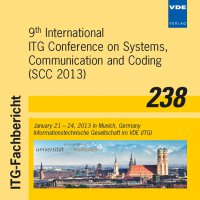The Two-Way Interference Channel: Robust Cooperation to Exploit Limited Backhaul Efficiently
Konferenz: SCC 2013 - 9th International ITG Conference on Systems, Communication and Coding
21.01.2013 - 24.01.2013 in München, Deutschland
Tagungsband: SCC 2013
Seiten: 6Sprache: EnglischTyp: PDF
Persönliche VDE-Mitglieder erhalten auf diesen Artikel 10% Rabatt
Autoren:
Rost, Peter; Samdanis, Konstantinos (NEC Europe Labs, Network Research Department, 69115 Heidelberg, Germany)
Inhalt:
The demanding resource requirements of future cellular networks call for interference mitigation techniques that allow for the required network densification. These techniques, however, rely on the exchange of channel state information and user-related data, which consumes substantial backhaulresources. To exploit backhaul resources efficiently, an asymmetric assignment of uplink and downlink in a TDD-system is investigated. An asymmetric assignment allows to reshape interference channels instead of mitigating inter-cell interference. Analytical results show that such an approach is more backhaulefficient, is more robust to imperfect channel state information, and provides significant gains over cooperative multi-point transceiver approaches, particularly towards the cell-edge. Index Terms — Two-way communication, interference channel, uplink-downlink-interference, cooperative communication


